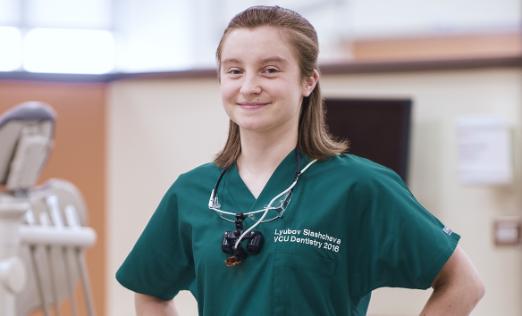Joining forces (2016)
Health care symposium improves patient care by encouraging interprofessional collaboration
By Brelyn Powell
Collaborating across health disciplines is routine for Lyubov Slashcheva, D.D.S. (D.D.S.’16/D), as she cares for adults in the University of Iowa School of Dentistry’s special needs clinic and nearby nursing facilities. In fact, she depends on her interactions with clinicians from other fields to help her provide patients with the care they need.
“I am not hesitant to reach out across disciplines and experience levels to meet the needs of my patients,” she says. “I work with people from a variety of disciplines both by necessity and opportunity. We all play a role in providing our patients with the best care.”
Knowing that her knowledge of oral health alone is not enough to address her patients’ full scope of needs, Slashcheva, a fellow in geriatric and special needs dentistry and a resident in public health dentistry at UI, has sought opportunities to work with her peers from other health professions throughout her dental career so far.
This fall, she joined the Iowa Leadership Education in Neurodevelopmental and Related Disabilities Project, an interdisciplinary leadership training program for graduate students committed to providing culturally competent, family-centered health care and related services for children with special health care needs and their families.
Slashcheva credits interprofessional experiences she had as a student in the Virginia Commonwealth University School of Dentistry with emboldening her to collaborate across disciplines. Each year during her time at VCU, Slashcheva attended the Jewell and Carl Emswiller Interprofessional Symposium, contributing to the event by serving on the planning committee and participating in student panel discussions.
Through a series of panels, breakout sessions and keynote speakers, attendees of the Emswiller Symposium learn how collaboration among health care professionals can improve the health of communities and enhance the patient experience. Health care educators, practitioners and students from throughout the region gather at this annual event to share how their institutions are preparing the future workforce to meet this challenge.
The Emswiller Symposium was endowed in 2012 with a gift from Jewell Emswiller to commemorate the accomplishments of her late husband, Carl (B.S.’62/P), a former VCU clinical faculty member and pioneer in collaborative pharmacy practice.
“Carl believed that patients receive the best care when there is a collaborative effort among their health care providers,” Emswiller says. “He would be humbled that professionals and students come from all over [the region] to attend a symposium in his name and learn how they can work together toward the same goal he strived for in his own career: to do everything in his capacity to provide patients with the best possible care.”
Throughout his 30-year pharmacy career, Carl Emswiller consistently sought to increase opportunities for others in his profession to have a more profound impact on patient health outcomes.
In 2009, an interdisciplinary committee of representatives from each health care discipline at VCU had just been formed to explore how they could work together to provide patients with optimal care. When Carl Emswiller passed away that same year, Jewell Emswiller and Victor Yanchick, Ph.D., then-dean of the School of Pharmacy, began to work with that committee to create the Emswiller Symposium in his memory.
Each year at the symposium, VCU students and professors share how collaborative educational programs on the MCV Campus teach students to join forces and employ one another’s different skill sets to fully serve the needs of a patient.
At the 2013 and 2015 symposia, VCU School of Nursing clinical assistant professor Tanya Huff, RN, CCRN, CCNS, CNE, gave presentations on one of the ways VCU health sciences students develop such an understanding through course-required, simulation-based exercises.
Her presentations showcased how interprofessional teams of VCU nursing, medical and pharmacy students work together through a series of realistic simulations to provide care for a patient experiencing a medical crisis. The teams must collaborate across professions to make a diagnosis and provide care that will produce the best patient outcome.
Huff, who co-directs the course with Christopher Hogan, M.D., FACEP (M.S.’10/M), an associate professor in the VCU School of Medicine, says very few institutions offer similar courses, and those that do offer them to limited numbers of students. What sets VCU’s efforts apart is that these exercises are requirements for all nursing and medical students.
“With the current emphasis on quality in health care, we all recognize that major improvements can only come from well-coordinated teams of health care practitioners,” says VCU School of Pharmacy Dean Joseph T. DiPiro, Pharm.D. “VCU has to lead the way in interprofessional education and practice.”
To learn more about the Jewell and Carl Emswiller Interprofessional Symposium, contact Ellen Carfagno, director of development, at (804) 828- 3016 or emcarfagno@vcu.edu.
